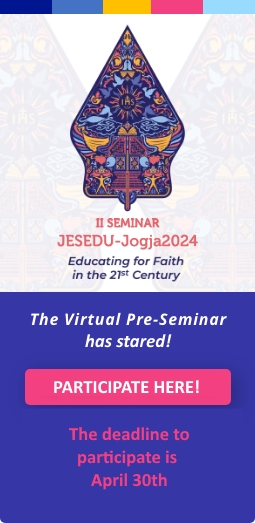The “family meeting” of the Jesuit and companion schools of the Central European Province took place from 21-23 September at the Zentrum für Ignatianische Pedagogik (ZIP) in Ludwigshafen, Germany.
Every two years the staff of this international network meet in Ludwigshafen to reflect together on their own pedagogical work in schools, boarding schools or all-day institutions. This year the focus was on Ignatian pedagogy.
In recent years there has been intensive work on the compatible translation of our own Christian educational approach in a secular and diverse society, and on the digitalisation of the schools in the network. In 2023, an in-depth reflection on our own tradition, i.e. Ignatian pedagogy as a distinct version of Christian humanism, was on the agenda.
Results of the “Ignatian Personality Formation” research project are available
During the conference, the results of an important research project carried out in collaboration with the ZIP Centre were presented. “The research project ‘Ignatian Personality Formation’ was commissioned by the University of Bern, Institute of Educational Sciences, Prof. Dr. Elmar Anhalt and Prof. Dr. Thomas Rucker. “The aim was to determine the position of Ignatian pedagogy from the point of view of educational science”, explains Ulrike Gentner, director of the ZIP, “the results are now available”.
What developments can be seen in this concept of education from an educational science perspective? How can the contribution of this form of Christian humanism be evaluated from the perspective of educational science in view of the challenges to a contemporary concept of education? And, of course, this also includes the question of where, compared to the concert of modern concepts, other accents are (self-)consciously set that are suitable for enriching the modern discourse, for example on how education and schools can be successful.

A wide variety of personal pedagogies
“The exciting thing about the study is that Prof. Rucker classifies Ignatian pedagogy in the field of educational science as a special kind of personal pedagogy. In our training courses, the question of the contribution of education to human development is often central – now we have a pedagogical classification so that we can also speak in this field,” says Verena Urban from ZIP.
The “Days of Ignatian Pedagogy” were not only a time for theoretical reflection on pedagogical concepts. In workshops, practitioners from schools, boarding schools and day-care centres had the opportunity to deepen their own understanding of Ignatian pedagogy and to re-orientate their own educational work in the classroom and in everyday school life. This year the following themes were emphasized:
- Global Citizenship – Education for Responsibility for Creation and (Global) Society”.
- Ignatian pedagogical development – teaching and learning with joy and confidence”.
- Words like arrows! – Towards a pedagogy based on appreciative authority”.
To think about the global dimension
“In Jesuit schools, young people should learn to act justly, in solidarity and responsibly. If we take this goal seriously, we must always consider the global dimension,” says Kai Stenull from ZIP, who led the Global Citizenship workshop. “The guiding principle of ‘Global Citizenship’ is a concept that fits wonderfully into Ignatian pedagogy,” emphasises Kai Stenull. “With the political youth education at the Henrich Pesch House (HPH) we want to strengthen the virtues of young people, which are necessary for the world of the 21st century”.
Alexander Mack from the ZIP team adds: “This becomes particularly clear with the example of climate”. He emphasises that political youth education has the important task of informing young people about these changes, reflecting on their effects and showing them options for active participation. “Political youth education strengthens young people’s resilience and tolerance of uncertainty. “We offer young people space to experiment with their own actions, on an individual and structural, local and global level,” he says, referring to the wide range of ZIP offers.

To protect trust
“The theme of ‘protecting trust’ is an important one in Ignatian pedagogy. “Ignatius of Loyola was far ahead of his time with his pedagogy and demanded that students should not experience violence at the hands of Jesuits,” emphasises Cathrin Rieger from ZIP, who led the “Words like Arrows” workshop. It was about boundary violations and what a shame-free and relationship-oriented pedagogy could look like.
In addition to the workshops, there was the opportunity for peer advice on one’s own educational work. Rarely does so much professional expertise from educational practice come together. Finally, the participants reflected in workshops on contemporary forms of spiritual practice and prayer, and shared examples of best practice.
Network of Ignatian Schools
The meeting in Ludwigshafen brought together representatives of the regional education network, which includes 13 schools from Germany, Austria, Lithuania and Hungary, as well as the Centre for Ignatian Pedagogy (ZIP). The meeting was also attended by representatives of the European Network of Jesuit Schools (JECSE) – organization that unite all Jesuit and companion schools in Europe and the Middle East, Jesuit Worldwide Learning – an institution that enables refugees around the world to study, and partners from foundations linked to the work of the network.
The “Days of Ignatian Pedagogy” also provided a fitting stage to welcome Gabriele Hüdepohl, the new Delegate for school education of the Central European Province of the Jesuits. In the area of school education, she represents the political leadership of the Central European Province both internally and externally.
